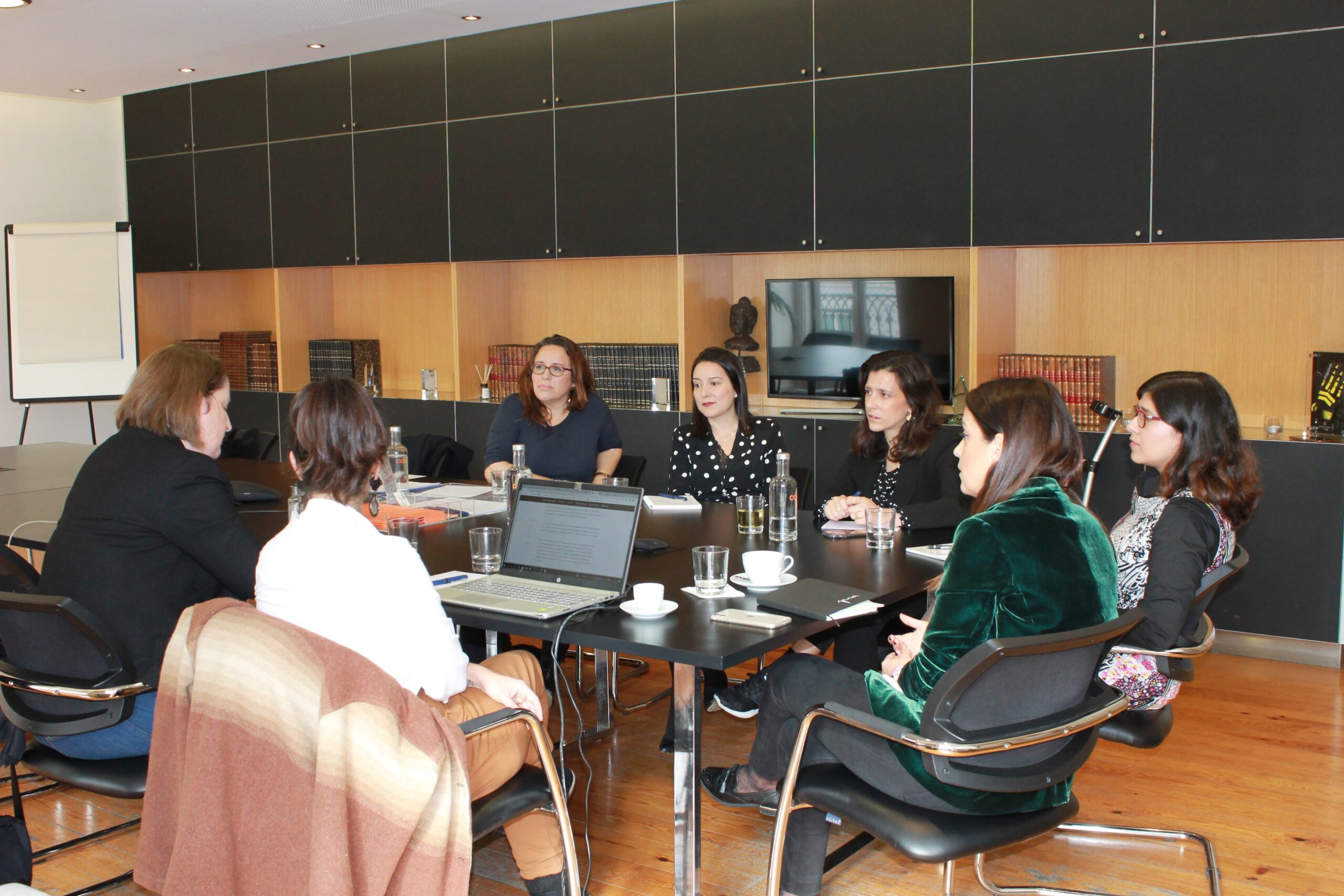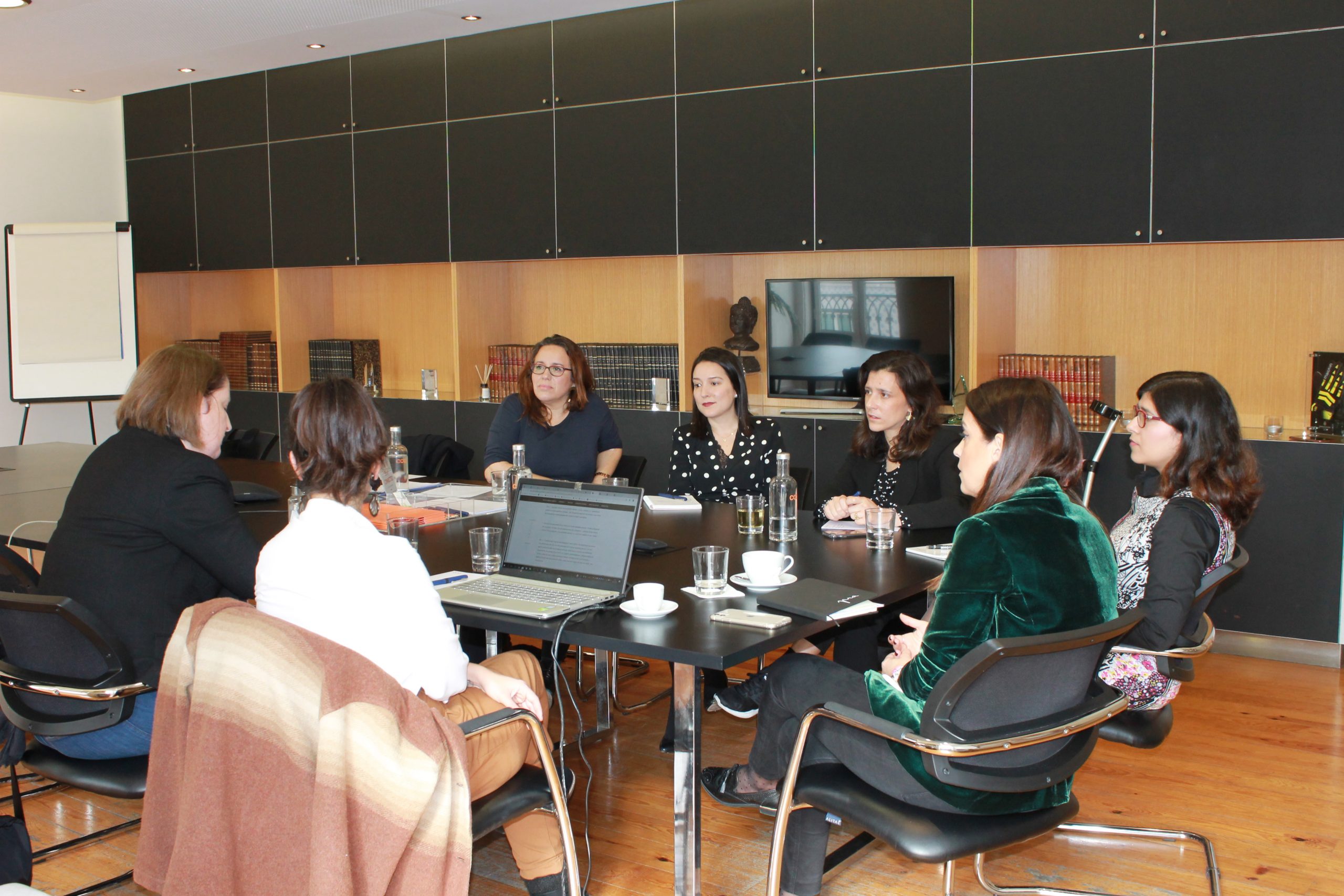It´s a women´s world

Iberian Lawyer organized a roundtable with six women that work in Communication and Marketing in the Legal Market for years. Alexandra Martins from FCB Legal, Andreia Vicente from CCA Legal, Florbela Silva from BAS Advogados, Sofia Godinho from PRA Advogados, Sofia Justino from Consulting and Susana Represas from LinkLaters talked for two hours about how they think the marketing work for the legal market and how being dominated by women changes the game.

On the internet, I found a website with “Personal marketing for women in the legal market” that said: “Learn to use natural qualities like your smile, friendliness. Learn to dress accordingly. You are what you sell. A sexy dress can be worn at a party but not at a meeting”. What do you think about this kind of content being written by men?
Sofia Godinho (SG) – We think about our image because we are professionals, both women, and men. In the workplace, there are dress codes for women and men alike.
Andreia Vicente (AV) – I think people who attend the public have to think about the image in general. Whether we are talking to lawyers or clients, we are also the business card of our company.
Sofia Justino (SJ) – We all know that in this area there has to be some concern about the image, some posture, some sensitivity, common sense but that doesn’t mean that a man doesn’t have it either. I entered the market in 2004 and maybe these tips were a premise in the beginning when people were hired. Let’s not be hypocritical. There was a tendency to go for more women. It’s evolved a lot.
Susana Represas (SR) – The way we develop the profession due to our inherent characteristics is also important not just looks. Management and organizational skills and emotional intelligence, for example, are quite useful in a law firm. However, I think mixed teams can be a great advantage.
Alexandra Martins (AM) – Female emotional intelligence combined with the more characteristic pragmatism of men, especially in this area, can complement each other very well.
In your environment, one deals with egos. In your role as the woman responsible for communication and marketing, is it easier to get your point of view across when you do not agree with something?
SJ – I think men sometimes devalue things that we take to heart. However, it is complicated to deal with some sort of superiority. We are in the leadership of a project and there is that attitude “Ah, it’s a woman,
it’s better to be on the lookout”.
SR – I’ve never felt that way because I’m a woman, maybe I felt it because I’m in communication and marketing. We must not forget that we are talking about a business run by lawyers, it is their market. We are support areas and they are now beginning to understand our importance in the performance of the firms.
SJ – When marketing began to enter the legal world, there was this question regarding the support area “let’s see what they do”, but there were some paternalism and condescension for being more women. There was a big growth at the expense of results as well, so that we could stop being “the girl who is
in communication” and become a professional.
And now the tables have turned because the market is all about image and you are needed more than ever.
AV – No doubt. And when we’re talking about such delicate issues as cybersecurity, we have to be extra careful because that reputation is back in the spotlight.
SG – It is no longer a profession that stays inside the office and no longer works only from lawyer to client. There is an important role for public opinion and the market here. In our office, we did an activity in which all areas explained what they were doing and the number of people who came to us to tell us that they had no idea what we were doing was incredible. In other words, it’s important to understand that there is an annual strategic plan for the firm. This year we told everyone “we make a plan, we set goals, budgets, KPI’s, everything.
SJ – our work is starting to be respected and the phenomenon is already transversal. In other words, it began in large societies but micro and small firms are already coming to us because it is already something to which they give extreme importance. They hire us and leave what to do in our hands. I feel that respect for the work and it has taken us years to achieve it.
When we talk about the reputation of firms, what does it “sell”? Do firms have to follow trends such as the discussion of gender equality, technology, ecological concern, social impact?
SR – Each type of client is looking for something, but those are the ones that firms can’t escape from. But never forget that what we are “selling” in fact is technical rigor, competence on a general level, the work itself. Portugal has grown and we are often talking about transactions involving more than one jurisdiction and with investors from various places and these people before choosing someone also do their research, so our target is no longer restricted to the country. Communication has to be adapted for each market because they are all different.
That is an important aspect. When there is a need to communicate something and do it in different ways, you guide the lawyers to do it the way you want. As women, do you feel friction?
SG – I always felt respect for what I was asking. What may not be so well received is when we talk about their work. An example: an ‘expert opinion’ where I say that the first paragraph is not good. There, we are entering a sensitive field.
AV – I even said that I wouldn’t publish opinion pieces from lawyers because they didn’t add anything and I was well interpreted most of the time. If it’s said in a way that won’t help reputation in a particular medium, we have to say no.
Technology has brought the lawyer and the firms closer to the public. What are the platforms you are using nowadays?
SJ – Social media is big but it is important to control the message and the speed with which things are done. Doing a live interview for a network is a huge risk. Another is to “teach” lawyers to be on social media. You cannot forget that there is the person who has the family but there is also the face of the firm.
AV – We manage the profiles of our lawyers on LinkedIn because it is mainly a professional platform.
SG – We’ve already had some questions with this peer exposure because from the moment it says in the PRA Advogados in your info, it’s about us. So we have guidelines for that behavior.
SR – But not only social media is important. Online, in general, has changed everything. Today, the response timings are for now or yesterday.
AM – This makes our work difficult because the requests come to us and we transmit them to the lawyer and there is an understanding of the task but on the agenda of your work, you have priorities.
SG – The younger ones tend to be more receptive to appear.
SR – But here it’s also important to talk about what you do outside the social world. The events, the newsletters, the training, the conferences, etc. I find this diversity very interesting for us in the marketing area. When I plan an event, I have to think clearly what I’m communicating, the sector in which it’s inserted, whom I’ll want to invite, what I mean, I don’t invite the whole list of contacts and this is the good part too.
AV – Small, sectorized events are increasingly the trend. Those huge events don’t bring much return on the client quota nor is there time to follow up.
SJ – We can’t forget that everything that is done at the marketing level has as its ultimate goal to attract more work and more clients. Therefore, all actions have to be integrated. How do we realize if we are on the right track? Metrics. Evaluate the results. Even though you all know each other, you are competitors. Is this competition between women healthy?
SF – We’ve always had a healthy relationship, we even have a group among us called “Legal Management Network Portugal”. We created the group and one of the concerns we had was not to share too much, to be careful. It’s funny that we never had any competition. We all get along well.
There are mothers at this table. How were your experiences with being pregnant and maternity leave in your companies? Did it hurt your career?
AM – I just got back from maternity leave and I’m adjusting again but I remember in my first interview I said right away that I would not do ‘lawyer’s hours. I have a son, I have to pick him up from school’. And I’ve never had any problems. I went away and left a rebranding going on. I left it in someone else’s hands and luckily it went well.
SR – Let’s not ignore the fact that there are more conditions today for a “work/personal life balance” but maternity leave is still a moment in our career of women and it’s a challenge to return.
Florbela Sivla (FS) – I told a marketing director I was going away for almost six months and he said: “six months? I was already working the next day”. You hear things like that too. One client, on the other hand, hired a lawyer who was four months pregnant.
SF – At my previous firms, everything went very well until my daughter was born. Today, she’s six years old. I went home on leave and when I got back I felt it wasn’t the same anymore. So much so that my intention to leave started there. I felt they expected the same from me as before I was a mother. It was nine years without children. I started working from and it was the worst thing I could have done. There was no home office culture. It was seen as a weakness and it was not well accepted. I don’t point the finger at anyone, I just talk about the culture of society. And it wasn’t that long ago, it was two years ago.
SR – Be aware that the business world is not keeping pace with the needs of schools. Work and school policies are on different paths.
SJ – In this case, maybe it’s the labor policy that’s wrong because schools can’t hold children’s parties at 7 pm, they’re tired. It’s important to take that into account.
AM – I don’t read emails outside of work hours. They have my number for something urgent and they know they can call, but other than that, no. I’ve established that good practice from the start and it works.
Article by Patricia Cardoso.
To read the article in full please download issue N.92 here












